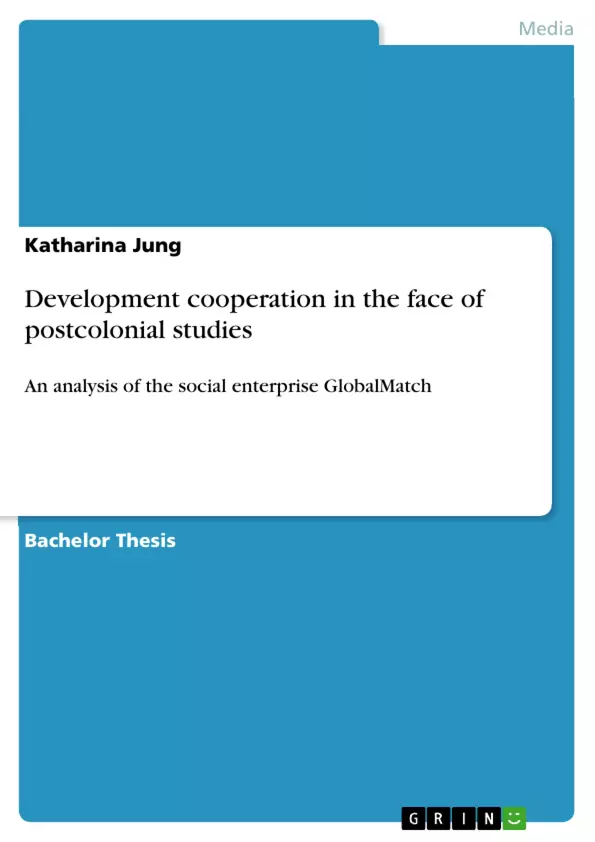Eye level, help to self-help, partnership - these are words constantly heard in the context of »development cooperation«. However, the notion »development« can be criticized for being a continuation of colonial thought patterns; a bare reproduction of western interests. Still, most western aid organizations claim as it were self-evident, that they practice a »development partnership« on equal footing with the global South. At first glance, it might seem obvious, that a relationship where there is a ‘donor’ and a ‘receiver’ can never be at eye level, because the donor has the power to decide when, how much, how long and for what (s)he wants to contribute. This directly implies a dependency, where the donor can set conditions which the receiver has to comply with. It is surprising, that even though the vast majority of western agents in this field of research and practice are very much aware of the diverse criticisms of their activities, they often do not realize that the relationship between the global North and South is constituted as a constellation of antagonisms, which were born in colonial times and frame the idea of »development cooperation« until today.
Colonial narratives of uncivilized versus civilized, traditional versus modern shape both our understanding and the order of the world. Thus, »development cooperation« is discerned through the glasses of postcolonial scholarship as a continuity to colonialism. Mostly overlooking this impressive compromise of postcolonialism, western development scholarship and practice defend their mission by arguing that injustices are happening in the global South, such as malnutrition or death due to diseases, which might not be too difficult to solve with the adequate transfer of knowledge and finances from the global North. An enlightening interpretation of the development project and its postcolonial criticisms has been provided by Christine Sylvester’s essay Disparate tales of the »Third World«.
Inhaltsverzeichnis (Table of Contents)
- Introduction
- Develop-mental turn within political science and human geography.
- From growth theory to postdevelopment critics
- What is development cooperation?
- Postcolonial studies and their influences on >>development<<.
- Othering and dichotomization, a tool for colonial suppression
- The linearity of »development« – universalization of a \"western❞ norm
- A neo-colonial praxis - western interests and manifestation of dependency
- The problem of representation – “speaking for” instead of \"speaking with”
- Methodology
- Auto-ethnography
- What auto-ethnography is and how it is applied
- The GlobalMatch concept and its interrelation with the researchers' self.
- Critical considerations on auto-ethnography and flaws to avoid
- Conversations open interview
- Discourse analysis
- Literature analysis
- The GlobalMatch concept in the face of postcolonial critics.
- Let's overcome the 'us' and 'them' dichotomy!
- Target group - Demarcation of the global North and South?
- Time, punctuality, reliability - who sets the rules?
- Dropouts - They only ask me for money.
- Countering the western »development« norm?
- Project collaboration – Role, self-image and perception of the participants?
- Accept it, there will never be equal footing - the role of infrastructure.
- What a nice idea with no effect! - Go for the system
Zielsetzung und Themenschwerpunkte (Objectives and Key Themes)
This dissertation critically examines the mission and experiences of GlobalMatch, a social venture that aims to bridge the gap between the global North and South through online partnerships. Guided by the question: "Can unequal global power relations be overcome by joint project work of people from the global North and South?", the study explores whether and how GlobalMatch dissolves or perpetuates postcolonial relations of power.
- The limitations and critiques of the "development" paradigm in a postcolonial context.
- The role of power dynamics and inequality in international development cooperation.
- The potential and limitations of online partnerships in fostering equitable global collaboration.
- The use of auto-ethnography to explore the researcher's own positionality and its impact on the study.
- The challenges of bridging the "North-South" divide in a way that avoids perpetuating existing inequalities.
Zusammenfassung der Kapitel (Chapter Summaries)
The dissertation begins with an introduction that sets the scene by discussing the concept of "development" and its postcolonial critiques. It then dives into the theoretical framework, exploring the historical and contemporary context of "development" research and practice. The chapter also provides an overview of postcolonial theory and its relevance to understanding development cooperation.
The dissertation then delves into the specific case study of GlobalMatch, exploring its mission, structure, and experiences. The chapter examines the challenges faced by GlobalMatch in navigating postcolonial power dynamics and critiques within its online partnerships.
Schlüsselwörter (Keywords)
This dissertation explores key concepts including development cooperation, postcolonialism, global North and South, power dynamics, online partnerships, auto-ethnography, and GlobalMatch. The research focuses on the critical examination of "development" practices, the role of postcolonial power structures, and the challenges of achieving equitable global collaboration.
Frequently Asked Questions
What is the main criticism of the "development" paradigm in postcolonial studies?
Postcolonial scholars argue that "development" often continues colonial thought patterns, reproducing Western interests and maintaining a dependency of the global South on the global North.
Can a "donor-receiver" relationship ever be on equal footing?
Critically, it is argued that as long as the donor has the power to decide the terms of the aid, a true partnership at eye level is difficult to achieve due to inherent power imbalances.
What is the "GlobalMatch" concept?
GlobalMatch is a social venture that attempts to bridge the gap between the global North and South through online project partnerships, aiming to overcome traditional aid hierarchies.
Why is auto-ethnography used in this research?
Auto-ethnography allows the researcher to explore their own positionality and self-image within the power dynamics of international cooperation.
What colonial narratives still shape development cooperation today?
Dichotomies such as "civilized vs. uncivilized" or "traditional vs. modern" continue to frame how the global North perceives and interacts with the global South.
- Quote paper
- Katharina Jung (Author), 2018, Development cooperation in the face of postcolonial studies, Munich, GRIN Verlag, https://www.grin.com/document/434979



